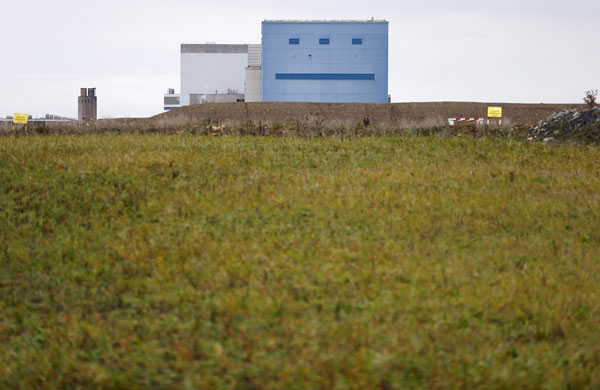Analysts: British infrastructure projects still appeal
Updated: 2016-08-19 07:55
By Cecily Liu in London(China Daily Europe)
|
|||||||||
 |
|
Hinkley Point A and B nuclear power stations are seen behind the site where Hinkley Point C nuclear power station will be constructed in Bridgwater in south west Britain, in this file photograph dated Oct 24, 2013.[Photo/Agencies] |
British infrastructure remains an attractive investment for Chinese companies keen to expand into developed markets, despite the uncertainty generated by Brexit and the new government's cautious approach to expensive projects, according to industry analysts.
In the long run, Britain will actually become more open to Chinese investment, lawyers and researchers predict, as Brexit will mean the loss of funding from European Union institutions.
Experts also are playing down concerns over the decision by Prime Minister Theresa May to delay approval of Hinkley Point C.
China has agreed to provide one-third of the funding for the nuclear power plant, which is forecast to cost 18 billion pounds ($23.5 billion; 20.8 billion euros), as the nation attempts to internationalize its nuclear industry. French energy company EDF, the main investor, gave the project the green light in July.
May's decision led some to suggest the delay was motivated by security fears, which could affect Chinese investment in other sectors where security is key, such as high-speed rail.
State-owned China Railway Group is reportedly preparing a bid for the UK's High Speed 2 project, which would be another breakthrough for Chinese industry in a developed economy.
However, Christopher Brown, a partner specializing in infrastructure finance at law firm Norton Rose Fulbright, says Britain will be in need of more foreign investment options when it eventually leaves the EU.
The government will have to look to replace EU institutional investors, he says, which means "this is a great opportunity for Chinese investors who have the right skill-sets and financial resources".
In July, Sir Amyas Morse, head of the National Audit Office, said in a speech at the Institute for Government that the British government will need to scrap billions of pounds worth of projects as a result of a what he called a "tidal wave" of economic pressures caused by Brexit.
Last year, the European Investment Bank committed almost 8 billion euros ($9.05 billion) to the UK, including more than 400 million euros for the expansion of Aberdeen and Liverpool ports and more than 525 million euros for the Caithness wind farm.
However, without EU membership, the UK will no longer be eligible for funding from the bank unless its board of governors unanimously authorize it. Either way, the volume of loans to the country will drop.
In addition, Brexit could mean the UK is no longer eligible for the so-called Juncker Plan, which aims to unlock 315 billion euros of infrastructure investment between 2015 and 2017. Currently, the plan includes eight major UK projects worth a total of 8.2 billion euros, which could create more than 70,000 jobs in total. Whether the funding continues will rely on the UK-EU exit negotiations.
Ian Wood, a partner at law firm King & Wood Mallesons, says it seems the new British government wants to take control of infrastructure projects, to take time to understand them and give approval, rather than relying on assessments by the previous government.
"This is unnecessary and unsettling for investors, as the previous government has already decided the projects are acceptable," he says. "By going through the approval process again, the UK risks losing energy security and infrastructure investors, as foreign investors may look to other countries due to the political uncertainties in the UK."
Morse says projects such as the third runway at Heathrow Airport and HS2 and the 24 billion pound Northern Powerhouse strategy will have to be reassessed as the government decides on which projects can be shelved.
China Investment Corp is a minority stakeholder in Heathrow. George Osborne, the former chancellor, also showcased a selection of Northern Powerhouse opportunities to investors during a visit to China in September.
Richard Marshall, a senior infrastructure analyst at BMI Research, says Brexit is unlikely to reduce the attractiveness of British infrastructure projects to Chinese investors.
"Chinese companies with a UK partner or subsidiary will still be well placed to target European infrastructure from the UK, albeit they won't have immediate access if the UK does not remain part of the single (European) market after negotiations are concluded," he says.
Sir Keith Burnett, vice-chancellor of the University of Sheffield, adds that Chinese companies remain competitive in the UK market due to their unique combination of innovation, financing and design, and that such integration is important for costly projects like nuclear power stations to control costs at each step, from financing to construction.
According to a 2014 report by law firm Pinsent Masons and the Centre for Economics and Business Research, Chinese companies have the potential to invest 105 billion pounds in British infrastructure by 2025.
( China Daily European Weekly 08/19/2016 page28)
Today's Top News
France's Sarkozy to run for 2017 presidential election
Turkey vows to cleanse IS from border after attack
Show of unity: Merkel, Hollande, Renzi meet
At least 22 victims in Turkey wedding attack under 14
Brexit will affect Chinese investment
Trump says he regrets past remarks
Ukrain to declare martial law if crisis deepens
Violence against Chinese in the UK under-reported
Hot Topics
Lunar probe , China growth forecasts, Emission rules get tougher, China seen through 'colored lens', International board,
Editor's Picks

|

|

|

|

|

|







